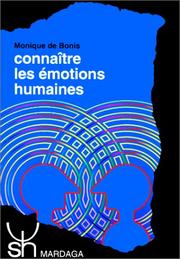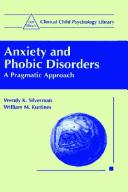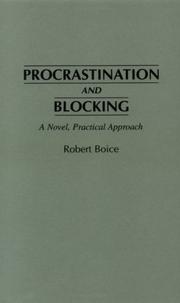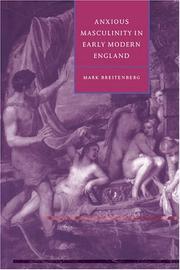| Listing 1 - 7 of 7 |
Sort by
|

ISBN: 2870094051 9782870094051 Year: 1996 Volume: 212 Publisher: Sprimont: Mardaga,
Abstract | Keywords | Export | Availability | Bookmark
 Loading...
Loading...Choose an application
- Reference Manager
- EndNote
- RefWorks (Direct export to RefWorks)
Affective and dynamic functions --- Emoties --- Emotions --- Emotions. --- Angoisse. --- Depression.
Book
Abstract | Keywords | Export | Availability | Bookmark
 Loading...
Loading...Choose an application
- Reference Manager
- EndNote
- RefWorks (Direct export to RefWorks)
Ame --- Angoisse --- Machisme --- Transsexualisme --- Joueurs (Jeux de hasard) --- Villes --- Vetements de femme

ISBN: 030645226X 0306452278 1475792123 Year: 1996 Publisher: New York : Plenum Press,
Abstract | Keywords | Export | Availability | Bookmark
 Loading...
Loading...Choose an application
- Reference Manager
- EndNote
- RefWorks (Direct export to RefWorks)
Anxiety in children --- Phobias in children --- Anxiety Disorders --- Angoisse chez l'enfant --- Phobies chez l'enfant --- in infancy & childhood --- diagnosis --- therapy --- Anxiety in children. --- Phobias in children. --- Medische psychologie --- in infancy & childhood. --- diagnosis. --- therapy. --- kinderpsychiatrie --- kinderpsychiatrie.

ISBN: 0275956571 9780313024269 031302426X 9798216001614 Year: 1996 Publisher: Westport, CT Praeger
Abstract | Keywords | Export | Availability | Bookmark
 Loading...
Loading...Choose an application
- Reference Manager
- EndNote
- RefWorks (Direct export to RefWorks)
Procrastination --- Inhibition --- Writer's block --- Angoisse de la feuille blanche --- Procrastination. --- Inhibition. --- Writer's block. --- Free will and determinism --- Habit --- Psychology --- Will --- Impulse --- Laziness --- Block, Writer's --- Authorship --- Psychological aspects

ISBN: 0520200438 0585184313 9780520200432 0520341090 Year: 1996 Publisher: Berkeley Los Angeles London University of California Press
Abstract | Keywords | Export | Availability | Bookmark
 Loading...
Loading...Choose an application
- Reference Manager
- EndNote
- RefWorks (Direct export to RefWorks)
The year 1910 marks an astonishing, and largely unrecognized, juncture in Western history. As the spectacle of Halley's Comet pierces the skies of Europe, traditional harmonies fade away and dissonance dawns. In this brilliantly conceived work, Thomas Harrison defines 1910 through a perceptive interdisciplinary analysis of the creative works produced during or close to that year, most of them as unsettling as the comet itself: the atonal music of Schoenberg, Berg, and Webern; the distraught poetry of Trakl, Campana, and Rilke; the militant philosophy of Lukacs, Simmel, and Buber; the abstract or subjectivist paintings of Kandinsky, Schiele, and Kokoschka. All are matched by historical and existential turbulence: epidemics of suicide and madness and the plight of Italians and Jews in the empire of Austria-Hungary. Unlike previous cultural studies of the pre-World War I era, this book locates the most significant traits of the period in Middle rather than Western Europe and in expressionism rather than in more celebrated developments of the avant-garde. Expressionism's violent extremes, Harrison argues provocatively, were the explosions of a last, desperate attempt by the intelligentsia to defend some of the most venerable presuppositions of Western culture. Among these were the idea of human subjectivity as the measure of all things, the habit of thinking in terms of antitheses, and belief in the universality of the understanding. Ultimately, Harrison claims, this ideological desperation was not only a spiritual prelude to World War I but also a prophetic, unheeded critique.
Angoisse --- Angst --- Angstigheid --- Anxieties --- Anxiety --- Anxiousness --- Anxiété --- Expressionism --- Expressionisme --- Expressionnisme --- Aesthetics, Modern --- Philosophy, Modern --- Esthétique moderne --- Philosophie --- Michelstaedter, Carlo, --- Europe --- Intellectual life --- Vie intellectuelle --- Expressionism. --- Anxiety. --- Aesthetics --- Philosophy --- Philosophy & Religion --- Esthétique moderne --- Modern philosophy --- History --- Michelstädter, C. --- Emotions --- Stress (Psychology) --- Agitation (Psychology) --- Fear --- Worry --- Aesthetics [Modern ] --- 20th century --- Michelstaedter, Carlo --- Philosophy [Modern ] --- 20th century europe. --- 20th century history. --- academic textbooks. --- carlo michelstaedter biographies. --- development of science. --- european anthropology. --- european cultural climate. --- european culture. --- european history textbooks. --- european history. --- european literature. --- european philosophy. --- european science. --- evolution of science. --- history of carlo michelstaedter. --- homeschool history textbooks. --- human sciences. --- learning from experts. --- philosophy textbooks. --- postwar history. --- study of culture. --- world war i history. --- year 1910.
Periodical
ISSN: 15206394 10914269 Year: 1996 Publisher: [New York, NY] : Hoboken, N.J. : Wiley-Liss, Inc., Wiley-Liss
Abstract | Keywords | Export | Availability | Bookmark
 Loading...
Loading...Choose an application
- Reference Manager
- EndNote
- RefWorks (Direct export to RefWorks)
Anxiety --- Depression, Mental --- Anxiety Disorders --- Depression --- Depression. --- Angoisse --- Dépression --- Anxiety. --- Depression, Mental. --- Anxiety Disorders. --- Abnormal Psychology. --- Dejection --- Depression, Unipolar --- Depressive disorder --- Depressive psychoses --- Melancholia --- Mental depression --- Unipolar depression --- Angst --- Anxieties --- Anxiousness --- Anxiety Neuroses --- Anxiety States, Neurotic --- Neuroses, Anxiety --- Anxiety Disorder --- Anxiety State, Neurotic --- Disorder, Anxiety --- Disorders, Anxiety --- Neurotic Anxiety State --- Neurotic Anxiety States --- State, Neurotic Anxiety --- States, Neurotic Anxiety --- Hypervigilance --- Nervousness --- Emotional Depression --- Depressive Symptoms --- Depression, Emotional --- Depressions --- Depressions, Emotional --- Depressive Symptom --- Emotional Depressions --- Symptom, Depressive --- Symptoms, Depressive --- Anti-Anxiety Agents --- Social Anxiety --- Anxieties, Social --- Anxiety, Social --- Social Anxieties --- Phobia, Social --- Affective disorders --- Neurasthenia --- Neuroses --- Manic-depressive illness --- Melancholy --- Sadness --- Emotions --- Stress (Psychology) --- Agitation (Psychology) --- Fear --- Worry --- Psychology --- Anxiety disorders. --- Dépression. --- Troubles anxieux. --- Anxiety neuroses --- Anxiety states, Neurotic --- Neurotic anxiety states --- Bipolar disorder

ISBN: 0521481414 9780521481410 0521485886 9780521485883 9780511586231 051158623X 0511887442 Year: 1996 Publisher: New York ; Cambridge Cambridge University Press
Abstract | Keywords | Export | Availability | Bookmark
 Loading...
Loading...Choose an application
- Reference Manager
- EndNote
- RefWorks (Direct export to RefWorks)
To recent studies of Renaissance subjectivity, Anxious Masculinity in Early Modern England contributes the argument that masculinity is unavoidably anxious and volatile in cultures that distribute power and authority according to patriarchal prerogatives. Drawing from current arguments in feminism, cultural studies, historicism, psychoanalysis and gay studies, Mark Breitenberg explores the dialectic of desire and anxiety in masculine subjectivity in the work of a wide range of writers, including Shakespeare, Bacon, Burton and the women writers of the 'querelles des femmes' debate, especially Jane Anger. Breitenberg discusses jealousy and cuckoldry anxiety, hetero and homoerotic desire, humoural psychology, anatomical difference, cross-dressing and the idea of honour and reputation. He traces masculine anxiety both as a sign of ideological contradiction and, paradoxically, as a productive force in the perpetuation of western patriarchal systems.
English literature --- Early modern, 1500-1700 --- History and criticism --- Man-woman relationships in literature --- Anxiety in literature --- Sex in literature --- Burton, Robert --- Bacon, Francis --- Criticism and interpretation --- Shakespeare, William --- English literature - Early modern and Elizabethan, 1500-1600 - History and criticism. --- Angoisse dans la littérature. --- Anxiety in literature. --- Literatur. --- Literature --- Littérature anglaise --- Man-woman relationships in literature. --- Mann --- Mannelijkheid. --- Masculinity in literature. --- Masculinité (psychologie) --- Masculinité dans la littérature. --- Männlichkeit --- Patriarcat dans la littérature. --- Patriarchat --- Patriarchy in literature. --- Relations entre hommes et femmes dans la littérature. --- Relations hommes-femmes --- Sex in literature. --- Sexualité dans la littérature. --- Sexualité --- Wensen. --- Early modern. --- Psychological aspects. --- English. --- History. --- Histoire et critique --- Dans la littérature. --- Bacon, Francis, --- Burton, Robert, --- Englisch, ... --- Shakespeare, William (1564-1616). --- Shakespeare, William, --- Critique et interprétation. --- Criticism and interpretation. --- Anatomy of melancholy (Burton, Robert). --- Love's labour's lost (Shakespeare, William). --- Rape of Lucrece (Shakespeare, William). --- 1500-1700. --- Geschichte 1520-1600. --- Englisch. --- Drama --- History of civilization --- anno 1500-1599 --- anno 1600-1699 --- Arts and Humanities --- History and criticism. --- Masculinity (Psychology) in literature --- Bacon de Verulam, François --- Bacon, François --- Literatura anglesa --- Literatura moderna --- Masculinitat --- Relacions home-dona --- Patriarcat --- Ansietat --- Sexualitat en la literatura --- Temes en la literatura --- Temes en la literatura.
| Listing 1 - 7 of 7 |
Sort by
|

 Search
Search Feedback
Feedback About UniCat
About UniCat  Help
Help News
News